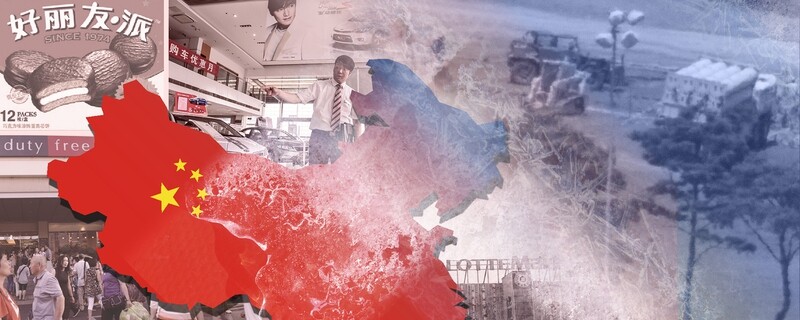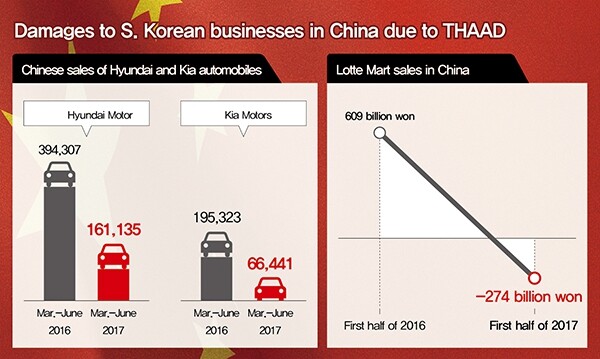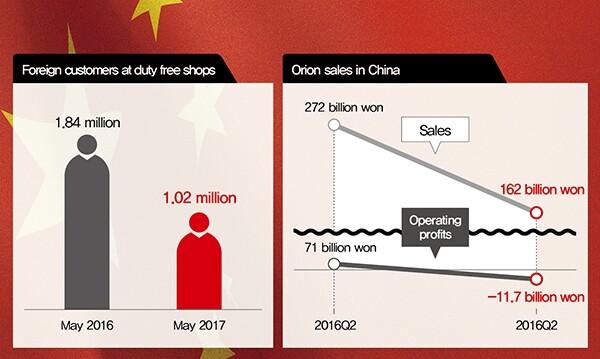hankyoreh
Links to other country sites 다른 나라 사이트 링크
In first half of 2017, THAAD retaliation caused $4.3 billion in losses for S. Korean companies

As China continues its economic retaliation for the US deployment of the THAAD missile defense system in South Korea despite the election of a new South Korean government, the damage suffered by South Korean companies is snowballing. Businesses are waiting to see whether President Moon Jae-in can find a solution to the dispute during the South Korea-China summit that will be held in Berlin, Germany, on July 6.
According to the Hankyoreh’s estimate on July 5, major South Korean firms doing business in China lost trillions of won in revenue just in the first half of the year. The companies where the damage was most pronounced are the Hyundai Motor Company and Kia Motors. In the first half of 2017 alone, it‘s estimated that they have lost around 5 trillion won (US$4.3 billion) in revenue. Since March, sales in the Chinese market have plunged by more than 50% during four straight months of declines. Just 429,000 vehicles altogether were sold in China in the first half of the year, representing a return to 2009 levels, when the companies were first entering the Chinese market. There are even concerns that sales this year will not even reach 1 million vehicles. Last year, they sold 1.79 million vehicles in China.

The China shock has spread to the small and medium-sized enterprises that supply parts to Hyundai and Kia’s factories in China. The Korea International Trade Association estimates that exports of automobile parts to China through May were valued at US$1.56 billion, down 33.2% from the same period last year.
The distribution and duty free shop sectors have also taken a direct hit. Because of the decreasing numbers of Chinese tourists to South Korea, duty free stores are estimated to have suffered around 600 billion won (US$520 million) in losses since March. The Chinese authorities have forced 74 of 99 Lotte Marts in China to shut down on various pretexts, including fire inspections. Over the past four months, the company’s damages are estimated to add up to 500 billion won (US$433 million). Declining sales of choco pies have also forced Orion to reduce its output by halting operations on some of its production lines.

Companies in the electric car battery industry, including Samsung SDI, LG Chem and SK Innovation, have been struggling because they’re not eligible for subsidies and support from the Chinese government. SK Innovation has even halted operations at its factories. Game developers are also unable to receive licenses from the Chinese government to sell their games.
These circumstances have led industry analysts to argue that China is just as motivated by its desire to protect certain domestic industries and products as by the diplomatic row over the THAAD deployment.
By Cho Kye-wan, staff reporter
Please direct questions or comments to [english@hani.co.kr]

Editorial・opinion
![[Guest essay] Amending the Constitution is Yoon’s key to leaving office in public’s good graces [Guest essay] Amending the Constitution is Yoon’s key to leaving office in public’s good graces](https://flexible.img.hani.co.kr/flexible/normal/500/300/imgdb/original/2024/0416/8917132552387962.jpg) [Guest essay] Amending the Constitution is Yoon’s key to leaving office in public’s good graces
[Guest essay] Amending the Constitution is Yoon’s key to leaving office in public’s good graces![[Editorial] 10 years on, lessons of Sewol tragedy must never be forgotten [Editorial] 10 years on, lessons of Sewol tragedy must never be forgotten](https://flexible.img.hani.co.kr/flexible/normal/500/300/imgdb/original/2024/0416/8317132536568958.jpg) [Editorial] 10 years on, lessons of Sewol tragedy must never be forgotten
[Editorial] 10 years on, lessons of Sewol tragedy must never be forgotten- [Column] A death blow to Korea’s prosecutor politics
- [Correspondent’s column] The US and the end of Japanese pacifism
- [Guest essay] How Korea turned its trainee doctors into monsters
- [Guest essay] As someone who helped forge Seoul-Moscow ties, their status today troubles me
- [Editorial] Koreans sent a loud and clear message to Yoon
- [Column] In Korea’s midterm elections, it’s time for accountability
- [Guest essay] At only 26, I’ve seen 4 wars in my home of Gaza
- [Column] Syngman Rhee’s bloody legacy in Jeju
Most viewed articles
- 1[Guest essay] Amending the Constitution is Yoon’s key to leaving office in public’s good graces
- 2Faith in the power of memory: Why these teens carry yellow ribbons for Sewol
- 3[Editorial] 10 years on, lessons of Sewol tragedy must never be forgotten
- 4Final search of Sewol hull complete, with 5 victims still missing
- 5[Guest essay] How Korea turned its trainee doctors into monsters
- 6How Samsung’s promises of cutting-edge tech won US semiconductor grants on par with TSMC
- 7Pres. Park an accomplice in ordering resignation of CJ Group vice chairman
- 8[News analysis] Watershed augmentation of US-Japan alliance to put Korea’s diplomacy to the test
- 9K-pop a major contributor to boom in physical album sales worldwide, says IFPI analyst
- 10Korea ranks among 10 countries going backward on coal power, report shows